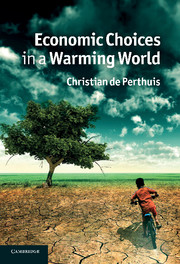Book contents
- Frontmatter
- Contents
- Acknowledgements
- Introduction
- 1 Climate risk
- 2 Some like it hot: adaptation to climate change
- 3 Building a low-carbon energy future
- 4 Pricing carbon: the economics of cap-and-trade
- 5 Intensifying agriculture to safeguard forests
- 6 The price of carbon: the economics of projects
- 7 Macroeconomic impacts: sharing carbon rent
- 8 International climate negotiations
- Conclusion
- References
- Appendix 1 Thirty key readings
- Appendix 2 Thirty key sets of figures
- Appendix 3 Greenhouse gas emissions around the world
- Glossary
- Index
7 - Macroeconomic impacts: sharing carbon rent
Published online by Cambridge University Press: 05 June 2012
- Frontmatter
- Contents
- Acknowledgements
- Introduction
- 1 Climate risk
- 2 Some like it hot: adaptation to climate change
- 3 Building a low-carbon energy future
- 4 Pricing carbon: the economics of cap-and-trade
- 5 Intensifying agriculture to safeguard forests
- 6 The price of carbon: the economics of projects
- 7 Macroeconomic impacts: sharing carbon rent
- 8 International climate negotiations
- Conclusion
- References
- Appendix 1 Thirty key readings
- Appendix 2 Thirty key sets of figures
- Appendix 3 Greenhouse gas emissions around the world
- Glossary
- Index
Summary
The town of Saumur on the river Loire is best known for its internationally reputed horse-training school, the Cadre Noir. Opulent residences rise up in tiers between the gently flowing river and the château perched on the hilltop. Time here seems to stand still. One can easily imagine bumping into characters from Balzac on the street corner. In fact the town is the setting for one of his most famous novels, Eugénie Grandet. Old father Grandet, the town's former cooper and a central figure in the novel, is the prototypal rentier or person of private means.
During his youth Grandet contributed to local prosperity through his barrel-making business. With the passage of time, he becomes a rentier. His properties are among the best located in the area and are particularly well served by public highways: a source of economic rent. Grandet's wine storage capacity enables him to sell his stocks when the vats of other producers are empty: a source of scarcity rent. His meadows bordering the Loire are more fertile than other land thanks to the alluvial deposits carried down by the river. Grandet therefore cut down the poplars that were covering the pasture in order to obtain this additional income: differential rent. When he is not contemplating his gold at nightfall, Grandet counts and re-counts his debt securities, which bring him fixed returns. Indeed the character has become ill from his rents.
- Type
- Chapter
- Information
- Economic Choices in a Warming World , pp. 169 - 190Publisher: Cambridge University PressPrint publication year: 2011



